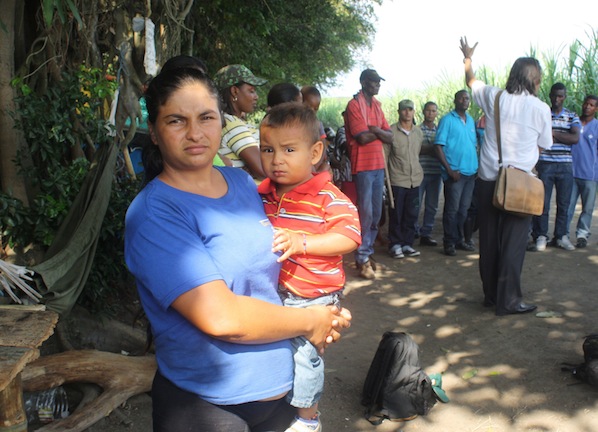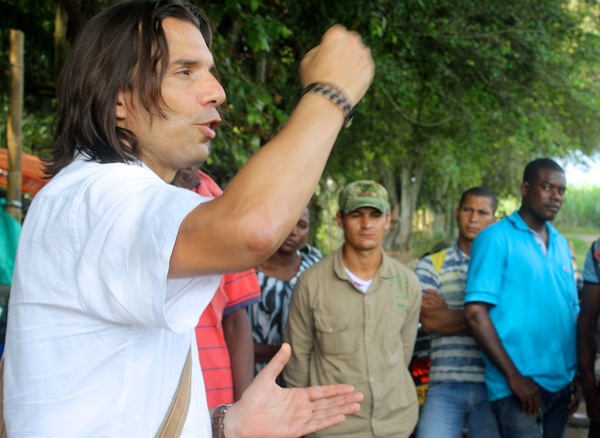El Cerrito, COLOMBIA—They were hungry and frightened about their fate, and Omar Serrano struggled for words to steady them.
“We are fighting for our labor rights,” said Serrano, president of a small, struggling sugar cane cutters union. “This is not about what is happening only here. But it's about what's happening all across Colombia.”
But his words brought little light to the faces of the 40 sugar cane cutters and their wives and children, gathered around him in the ragtag camp in the midst of a vast sugar cane hacienda.
They were down to living on beans and coffee and some bread. With little help from others, they recently began scrounging for worms from the ground. They were also drinking water out of the slimy stream that gurgles through the sugar cane fields.
Their children were getting sick and, more than 45 days since their strike began, over half of the original strikers had walked away in fear of losing their jobs or of violence or simply out of desperation.

The challenges facing unions, and especially small ones like Serrano's that are struggling to get a footing, are enormous and heartbreaking in Colombia.
Their ranks have fallen to 4 percent of the workforce, down from 15 percent more than two decades ago. Companies' anti-union tactics and violence, which has claimed the lives of more than 2,900 workers since 1986, are the reasons for unions’ plight, say union officials and human rights groups.
The Free Trade Agreement signed between the United States and Colombia in 2011 was supposed to sweep away companies’ sham labor deals and protect union organizing. But Rhett Doumitt, head of the AFL-CIO-funded Solidarity Center in Bogotá, said the Colombian government has applied the new protections “haphazardly” and only under intense union pressure.
U.S. officials in Washington, D.C., who would only speak on background, were generally positive, however, about what’s been happening in Colombia.
They pointed out that the decline in union members’ murders has been significant, and that Colombia’s funding for protection efforts for workers has increased dramatically.
“The Colombians have successfully met the milestones,” said one official, referring to the provisions laid out in the trade agreement regarding unions and workers. US officials hear the complaints raised by unions and others and are “engaged” with the Colombians about them, he said.
“This is not a black-and-white thing,” the official added.
The U.S. State Department’s 2012 Human Rights report on Colombia raised some serious concerns, however. It cited ongoing “violence, threats, harassment” by paramilitaries that have hampered unions’ organizing. It also said many companies continued to use shell organizations rather than hire their workers directly.
And Amnesty International reported this month that the paramilitary group Los Rastrojos has issued death threats against several dozen trade unionists.
Strongly defending his country’s efforts, Alfonso Cuellar, the deputy chief of the Colombian mission in Washington, D.C., pointed to “significant advances” in the trade agreement’s key areas for workers and unions.
The government of President Juan Manuel Santos “is really committed” to carry out the agreement, Cuellar said.
“When you are in the process of changing a culture from many years, it takes a long time to change things,” added Cuellar, who took part in the agreement’s negotiations.
But Omar Serrano is impatient, aware that his effort needs to gain traction soon. He also realized the risks he faces. The heads of two sugar cane unions and a lawyer for a sugar cane union have been gunned down in the last two years.
A sugar cane cutter for nearly of his life, working in the heart of Colombia's richest fields, where the haciendas date back for centuries, Serrano began organizing fellow workers two years ago.
But his 650-member union has yet to sign a contract with a sugar producer. It has a contract with a subcontractor, as is the case for many unions in Colombia.
A thin, solemn-faced man, Serrano recited the reasons why he would take on the challenge of creating a union.
Sugar cane workers without a union do not know how long they will have work or even when they will work, he said. They work from morning to night, seven days a week and without any breaks or vacation if there is work for them, he said.
They get paid by the weight of the cane they cut and in most cases, he said, that comes out to $10 a day. However, pensions and health care and other costs can eat up to $5 a day of their pay, he added.
“We have people who are 75 years old and they don’t have a pension,” he said.
With so few members, and not one direct contract with a sugar grower, the union has little clout. That has been a problem for the workers with the one subcontractor. They have a deal, but little more.
One his way to the meeting with the strikers in El Cerrito, Serrano stopped to talk with workers at these fields. They too were unhappy.
They said that they were losing out on money because the cane they were cutting was lighter weight than usual. And so, they said, they were working as hard as usual but getting paid less. They also complained that the buses that take them home from the fields sometimes show up three or four hours late, leaving them stranded in the broiling, hot fields.
When he arrived at the fields where the strikers were awaiting him, word about his visit apparently got out, because the company left a giant tractor to block the road to the camp. So the workers sent motorcycles that took him and others over the muddy roads.
Officials from the sugar cane grower were unavailable for comment despite repeated telephone calls.
At the camp, one of the group's leaders glumly summed up their situation.
“We are living in a terrible situation. It's terrible,” said Jose Nelson Moreno. “We are here defending our jobs with our wives and children.
Others said they were losing their homes or failing behind on bills—bills they couldn't afford. They felt hurt that they hadn’t received much help from others or that there had been little news coverage of their strike.
“Look at our children,” said Rosalina Morales, pointing down at her two-year-old son and others standing nearby. “We know that they all will be sick soon.”
One worker showed the large, nearly empty stew pot where they cooked for the group and pointed out how little food supplies they had.
Alberto Bejarano (below), an assistant for Colombian Senator Alexander López Maya, a left-of-center politician and a strong supporter of Colombian unions, stepped forward to talk to the group.

He spoke at length and passionately about the meaning of the strike and the need to stand strong. The sugar industry is important and influential in Colombia, he said.
“And so, whatever happens here is important,” he said, waving his arms and turning again and again to the reason why they needed to stand strong.
It was the kind of speech that must have been made countless times in countless places like Colombia today, where unions struggle just to exist.
The Pulitzer Center for Crisis Reporting supported this reporting. All photos by Stephen Franklin.

